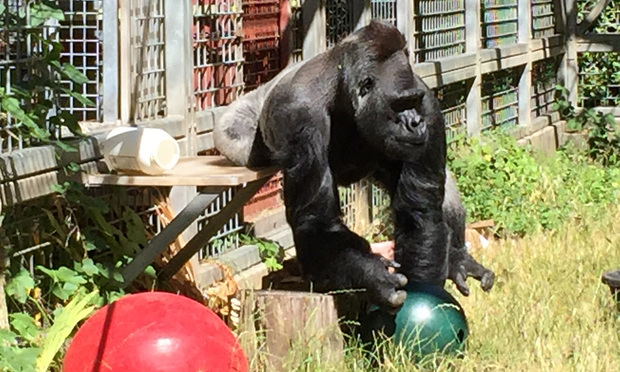Gorilla Foundation Moves to Sideline PETA in Fight Over Koko's Companion
"PETA is not a party to the contracts at issue in this case," wrote lawyers for The Gorilla Foundation. "No one from PETA claims to have even once seen Ndume during his 37 years."
January 11, 2019 at 06:58 PM
4 minute read
 Silverback gorilla Ndume picks up a toy at The Gorilla Foundation's preserve in California's Santa Cruz mountains. Photo: Ron Evans/Cincinnati Zoo and Botanical Garden via AP
Silverback gorilla Ndume picks up a toy at The Gorilla Foundation's preserve in California's Santa Cruz mountains. Photo: Ron Evans/Cincinnati Zoo and Botanical Garden via AP
A Bay Area animal research nonprofit is fighting to keep PETA out of a legal dispute over the fate of the former companion of Koko, the western lowland gorilla who famously learned sign language.
The Cincinnati Zoo sued Koko's longtime caretaker, psychologist Francine “Penny” Patterson, and her Redwood City-based nonprofit, The Gorilla Foundation, in October seeking the return of Ndume, a male gorilla it loaned the foundation back in 1991 in hopes that he and Koko would mate.
The Gorilla Foundation's lawyers at the Casselman Law Group and Cotchett, Pitre & McCarthy have argued that Ndume's age, 27 years of experience living under the foundation's care, and history of troublesome behavior while in zoo captivity would make any move a serious risk to the gorilla's health. On Friday, they sought to block PETA from weighing in on the case.
“PETA is not a party to the contracts at issue in this case,” wrote the foundation's lawyers. “No one from PETA claims to have even once seen Ndume during his 37 years.” The lawyers pointed out that no one at PETA has visited the foundation or even asked to visit.
PETA lawyers this week submitted an amicus brief backing the zoo's motion for summary judgment. In their own brief, the PETA lawyers argue that the foundation's “sloppy and inaccurate” characterization of the Endangered Species Act could negatively impact their organization work in protecting animals from substandard facilities.
“Just in the past six years PETA has helped re-home more than 120 captive wild animals in the United States from substandard conditions to reputable facilities, including ten great apes and many other endangered animals,” the PETA lawyers wrote. “Notably, despite many of them having compromised health and/or being of advanced age, none of these animals suffered harm during transport.”
The zoo's lawyers at Covington & Burling and Taft Stettinius & Hollister are seeking a court order forcing the foundation to return Ndume under the terms laid out in a 2015 agreement claiming that the terms of the contract are “unambigous.”
“The foundation agreed in 2015 that when Koko died certain experts would decide what was best for Ndume,” said Covington's Simon Frankel in a phone interview Friday. “This idea that this transfer would harm Ndume is simply not factually supported.”
David Casselman of the Casselman Law Group said in a phone interview Friday that PETA's attempt to join the case was “more about PETA than it is Ndume.”
“Ndume is an individual and he is entitled to be evaluated as an individual,” Casselman said. Casselman said that the foundation is concerned that if the decision is made solely on the basis of the contract without considering Ndume's individual needs it could “ destroy the object of the contract in the process.”
For his part, U.S. District Judge Richard Seeborg, the federal judge in San Francisco who is overseeing the dispute, has urged the parties to come to some sort of agreement about Ndume's future outside the courtroom, perhaps with input from other organizations with animal welfare expertise.
“Without prejudging the merits of the arguments presented by either side, it seems probable that deciding the dispute based solely on whatever legal principles would govern on the factual record would not necessarily lead to the result that is in Ndume's best interests, regardless of which side may be correct regarding those interests,” wrote Seeborg, in a Dec. 17 order directing the parties to meet concerning expedited alternative dispute resolution. “The forum of the courtroom may not allow for a full, and fully informed, evaluation of all of the potential impacts to Ndume of any particular course of action.”
Despite the judge's entreaty, the parties have completed briefing on the zoo's summary judgment motion. A hearing is set on the matter for Jan. 24.
This content has been archived. It is available through our partners, LexisNexis® and Bloomberg Law.
To view this content, please continue to their sites.
Not a Lexis Subscriber?
Subscribe Now
Not a Bloomberg Law Subscriber?
Subscribe Now
NOT FOR REPRINT
© 2025 ALM Global, LLC, All Rights Reserved. Request academic re-use from www.copyright.com. All other uses, submit a request to [email protected]. For more information visit Asset & Logo Licensing.
You Might Like
View All
Crypto Exchange’s ‘Meteoric Rise’ Leads to Nationwide Class Action Trend
4 minute read
Penn State Dickinson Law Dean Named President-Elect of Association of American Law Schools
Trending Stories
- 1Family Court 2024 Roundup: Part I
- 2In-House Lawyers Are Focused on Employment and Cybersecurity Disputes, But Looking Out for Conflict Over AI
- 3A Simple 'Trial Lawyer' Goes to the Supreme Court
- 4Clifford Chance Adds Skadden Rainmaker in London
- 5Latham, Kirkland and Paul Weiss Climb UK M&A Rankings
Who Got The Work
J. Brugh Lower of Gibbons has entered an appearance for industrial equipment supplier Devco Corporation in a pending trademark infringement lawsuit. The suit, accusing the defendant of selling knock-off Graco products, was filed Dec. 18 in New Jersey District Court by Rivkin Radler on behalf of Graco Inc. and Graco Minnesota. The case, assigned to U.S. District Judge Zahid N. Quraishi, is 3:24-cv-11294, Graco Inc. et al v. Devco Corporation.
Who Got The Work
Rebecca Maller-Stein and Kent A. Yalowitz of Arnold & Porter Kaye Scholer have entered their appearances for Hanaco Venture Capital and its executives, Lior Prosor and David Frankel, in a pending securities lawsuit. The action, filed on Dec. 24 in New York Southern District Court by Zell, Aron & Co. on behalf of Goldeneye Advisors, accuses the defendants of negligently and fraudulently managing the plaintiff's $1 million investment. The case, assigned to U.S. District Judge Vernon S. Broderick, is 1:24-cv-09918, Goldeneye Advisors, LLC v. Hanaco Venture Capital, Ltd. et al.
Who Got The Work
Attorneys from A&O Shearman has stepped in as defense counsel for Toronto-Dominion Bank and other defendants in a pending securities class action. The suit, filed Dec. 11 in New York Southern District Court by Bleichmar Fonti & Auld, accuses the defendants of concealing the bank's 'pervasive' deficiencies in regards to its compliance with the Bank Secrecy Act and the quality of its anti-money laundering controls. The case, assigned to U.S. District Judge Arun Subramanian, is 1:24-cv-09445, Gonzalez v. The Toronto-Dominion Bank et al.
Who Got The Work
Crown Castle International, a Pennsylvania company providing shared communications infrastructure, has turned to Luke D. Wolf of Gordon Rees Scully Mansukhani to fend off a pending breach-of-contract lawsuit. The court action, filed Nov. 25 in Michigan Eastern District Court by Hooper Hathaway PC on behalf of The Town Residences LLC, accuses Crown Castle of failing to transfer approximately $30,000 in utility payments from T-Mobile in breach of a roof-top lease and assignment agreement. The case, assigned to U.S. District Judge Susan K. Declercq, is 2:24-cv-13131, The Town Residences LLC v. T-Mobile US, Inc. et al.
Who Got The Work
Wilfred P. Coronato and Daniel M. Schwartz of McCarter & English have stepped in as defense counsel to Electrolux Home Products Inc. in a pending product liability lawsuit. The court action, filed Nov. 26 in New York Eastern District Court by Poulos Lopiccolo PC and Nagel Rice LLP on behalf of David Stern, alleges that the defendant's refrigerators’ drawers and shelving repeatedly break and fall apart within months after purchase. The case, assigned to U.S. District Judge Joan M. Azrack, is 2:24-cv-08204, Stern v. Electrolux Home Products, Inc.
Featured Firms
Law Offices of Gary Martin Hays & Associates, P.C.
(470) 294-1674
Law Offices of Mark E. Salomone
(857) 444-6468
Smith & Hassler
(713) 739-1250








